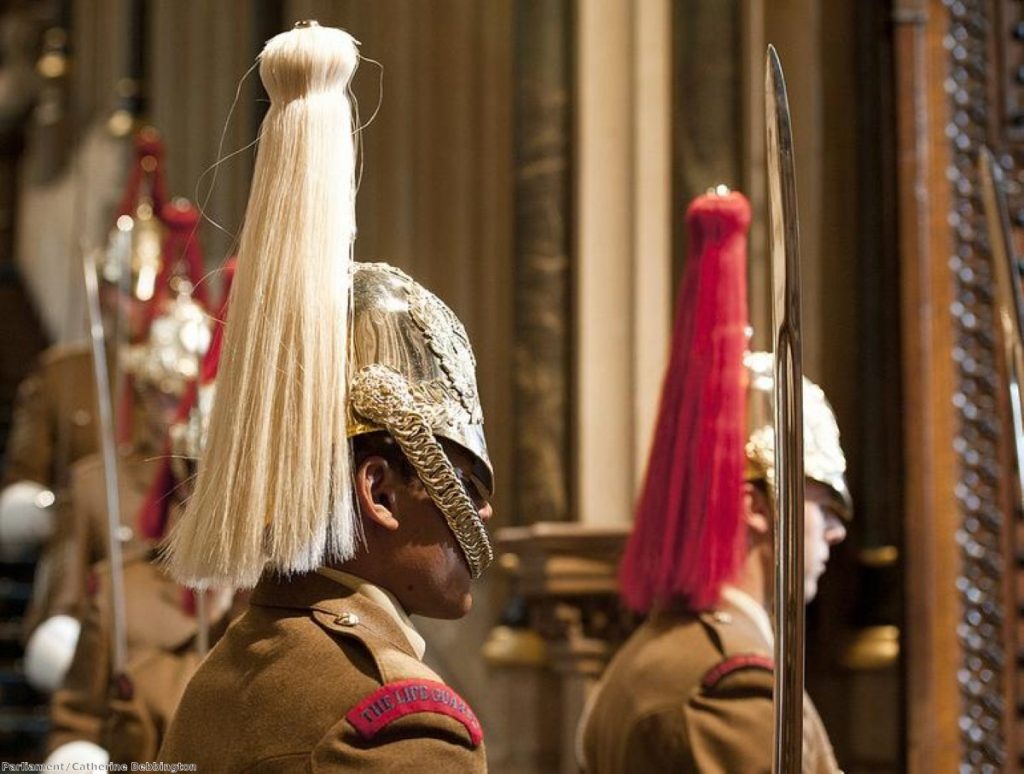Queen’s Speech sketch: Lords didn’t bat an eyelid as Her Maj announced their demise
Only in this setting would a group of politicians, informed of their imminent demise, decline from yelling out their objections. In the presence of the Queen, at least, the Lords were keeping their noble mouths shut.
The Queen's Speech is usually met in silence. Always, in fact, bar the one time when New Labour got the monarch to announce the scrapping of hereditary peers. Both opponents and supporters of that big change couldn't help but bray their views back in 1998. So it was with something more than the usual anticipation that we awaited the Queen revealing the government's plans on this occasion.
There is always a lot of buildup to this event. We were seated in the Lords a full hour before the scheduled arrival of the monarch in the chamber. This is an opportunity for careful study of our assembled rulers. Sayeeda Warsi sat discreetly on the back row of the government benches, quietly reading what looked very much like a Kindle. Charlie Falconer, on the front row of the opposition benches, looked even more like Father Christmas sans beard than usual. In the narrow gallery ringing the Lords chamber Samantha Cameron and Sally Bercow sat a few seats apart. One was dressed demurely. The other wore a loud pink jacket and attention-grabbing floral dress. No prizes for guessing which is which.
The waiting went on and on. Peers wearing their red robes lined with ermine fur (a vegetarian option is available) wafted themselves with the paper explaining the ceremonial. There is much amusement value to be had from this document. We learned that John Robinson Esq was this year's Maltravers Herald Extraordinary and that Her Royal Highness the Princess Royal was reprising her role as Gold Stick in Waiting. The tiaras seemed as amused by all this as anyone else, although there were fewer ostentatious dresses than usual. This is austerity Britain, after all.


At the appointed hour the Queen entered, accompanied by the entourage to end all entourages. Air Chief Marshal the Lord Stirrup (you can call him 'Jock') wielded the thoroughly medieval Sword of State. On the Queen's other hand Lord Strathclyde, the leader of the Lords, held British politics' equivalent to the Sorting Hat, the Cap of Maintenance. To the disappointment of all Harry Potter readers it remained mute throughout.
After the usual race to stand up on the Queen's entry the monarch sat down, dignified as ever, hands clasped quietly in her lap as she bore the weight of her glittering crown. She was all glitter, in fact; the slightest movement was enough to light up little sparkles across her white dress. Beware anyone who writes of her 'dazzling' jewellery. She was not dazzling. But for a mini-fireworks display of light, this was not bad going.
Prince Philip adopted a more jaunty pose on his throne, left arm resting gallantly on its arm. Even at 90 he is the most gallant man in the room.
All was ready. The splendour of the Lords was at its utmost. Its silence of fevered anticipation was broken by a slow murmuring, growing louder and louder. A large group of people, obviously unsophisticated intruders, was approaching from within the echoey recesses of the Palace. It was, of course, the Commons: contemptuous of the monarch's power, their chit-chat is as much a part of this careful choreography as is Black Rod's bashing on their closed door.
Kenneth Clarke returned to his celebrated role as lord chancellor, which involves carrying the Speech itself in the middle of what looks like an enormous tapestry. His portly stature seemed much more appropriate to the job than that of Jack Straw, who last filled those buckly shoes. The tricky part of this job is reversing backwards down the steps of the throne, but Clarke chose instead to retreat in the more usual, safer fashion. He made up for it with a monstrously big bow.
After MPs had assembled – there is just enough room for both frontbench teams to fit into their very limited part of the chamber – the Queen began reading. I told you there was a lot of buildup. It was time for the Speech itself, an uncomfortable mixture of dealing with the economy, appeasing Tory MPs and – most controversially – constitutional reforms.
Today the Queen told peers, in no uncertain terms: "A bill will be brought forward to reform the composition of the House of Lords."
The switch to an elected Lords is going to dominate the next two years of political life in Britain. But this announcement was met with nothing but silence from the assembled throng of peers, MPs, diplomats and hangers-on. A sharp cough from stage right pierced the atmosphere. The Queen ploughed on, and the moment had passed.
Perhaps the difference between now and 1998 was that then the move appeared a done deal. This time, the chances of Lords reform actually passing are very low indeed; a probable majority of the politicians gathered here are likely to fight against the change as hard as they can. Better to bide their time, then, than cause a fuss now.
Besides, there is something about the atmosphere of the Lords chamber during the state opening of parliament which makes it seem like the entire affair is divorced from the grubby day-to-day affairs of state. This is about ceremony, spectacle and nationhood, not the plottings of transient prime ministers and their even more transient deputies. "Time to re-enter the real world," one spellbound visitor remarked as she tottered out of the galleries lining the chamber. Too right: it's in the Commons this afternoon where the real politicking will take place.

